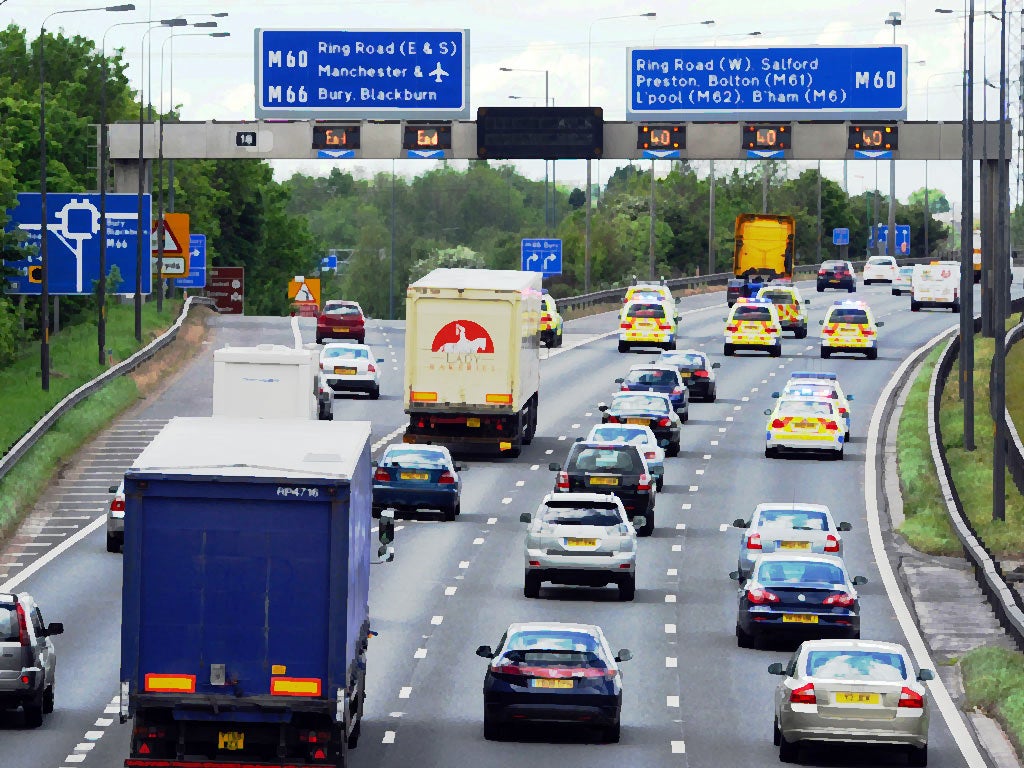New 80mph motorway limit, 20mph in towns
Government set to launch radical overhaul of Britain's road regulations

Your support helps us to tell the story
From reproductive rights to climate change to Big Tech, The Independent is on the ground when the story is developing. Whether it's investigating the financials of Elon Musk's pro-Trump PAC or producing our latest documentary, 'The A Word', which shines a light on the American women fighting for reproductive rights, we know how important it is to parse out the facts from the messaging.
At such a critical moment in US history, we need reporters on the ground. Your donation allows us to keep sending journalists to speak to both sides of the story.
The Independent is trusted by Americans across the entire political spectrum. And unlike many other quality news outlets, we choose not to lock Americans out of our reporting and analysis with paywalls. We believe quality journalism should be available to everyone, paid for by those who can afford it.
Your support makes all the difference.The speed limit on Britain’s motorways is set to rise to 80mph but with a big expansion in the number of 20mph zones in cities and towns, The Independent has learnt.
Click HERE to view graphic (96k jpg)
The Government's intention to bring in the new speed limit will be announced at the Conservative Conference next week by the Transport Secretary, Philip Hammond, as part of a deal negotiated with the Liberal Democrats.
Ministers will consult on the proposal later in the year along with plans to expand significantly the number of areas covered by a 20mph limit.
Mr Hammond argues that the new 80mph limit will shorten journey times and help boost the economy. But the move will be criticised by environmentalists who point out that cars use about 20 per cent more fuel at the higher speed. Road safety campaigners condemn the proposals, saying it will lead to an increase in deaths and serious injuries.
Police currently turn a blind eye to most motorists who drive at 80mph, and they are rarely prosecuted. There are concerns though that if the change goes ahead, 90mph could become the new 80mph. As part of the deal, the police will be expected to enforce the new speed limit more rigorously.
A source close to the negotiations said: "The Tories wanted to announce the 80mph limit next week because it appeals to their base and they can sell it as promoting business. Meanwhile the Liberal Democrats claim there is strong evidence that, in road safety terms, expanding 20mph zones saves lives. A deal has now been done and will all go into one consultation paper."
The latest Department for Transport statistics show that 49 per cent of cars travelling on motorways last year exceeded the 70mph limit. One in seven was recorded at 80mph or faster.
Mr Hammond has already made clear his concern that anti-car campaigners have for too long used road safety as an excuse to prevent the speed limit on motorways being raised.
He believes that safety cannot be the sole determining factor when changing limits, and that the economic impact must also be taken into account.
He has called for a "rigorous cost-benefit analysis of speed limits" which will look beyond simple safety issues. "If you took just that view, you would have 10mph limits everywhere," he said.
Ministers and experts argue that raising the speed limit could boost the economy. They say that a modest rise would mean quicker journeys for employees, reps and delivery vans. Lorries above 7.5 tons are restricted to 60mph on motorways. This is expected to remain.
Supporters of raising the limit point out that when 70mph was introduced, in 1965, it was the maximum speed of most cars at the time.
Opponents say it will lead to an increase in casualties. There were 132 deaths on motorways in 2009, when the total number of road deaths was 2,222 – the lowest since records began.
"The Government should be looking to reduce the number of deaths and injuries on our roads, not putting forward proposals which are likely to increase them," said Ellen Booth, of the campaign group Brake.
Britain has some of the safest roads in Europe, as well as a lower speed limit than most. The maximum in France and Italy is 81mph, while in Ireland, Spain and Portugal it is 75mph. Germany's autobahns are unrestricted.
Is a rise in the speed limit a good idea? Let us know your thoughts in the comments below.
Subscribe to Independent Premium to bookmark this article
Want to bookmark your favourite articles and stories to read or reference later? Start your Independent Premium subscription today.
Join our commenting forum
Join thought-provoking conversations, follow other Independent readers and see their replies
Comments